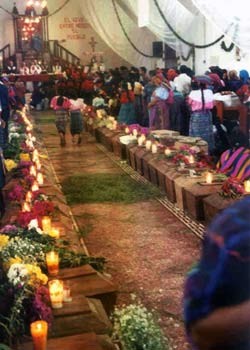
Twenty-two years ago, men, women, and children in Guatemala's highlands were brutally massacred in a state-sponsored genocide during the country's decades-long civil war. Today, communities have finally been able to take legal action and declare the existence and location of clandestine cemeteries - the first step toward having the Guatemalan Forensic Anthropology Foundation (FAFG) exhume a mass grave.
Though painful, exhumations and reburials are important for communities. Survivors can identify their loved ones' remains and prepare them for proper reburial - a process that often brings the empowerment and closure people need to lead healthy and productive lives again. Soon after a reburial, it is common for communities to clamor for better health care, literacy training, income generating opportunities and other services.
USAID is funding human rights and reconciliation work throughout Guatemala that enables FAFG and other human rights organizations to provide mental health services to communities and conduct 60-70 exhumations each year. In spite of death threats to the FAFG director and personnel, the program continues to exceed its targets and is one of the most successful human rights and reconciliation projects of its kind.







Comment
Make a general inquiry or suggest an improvement.